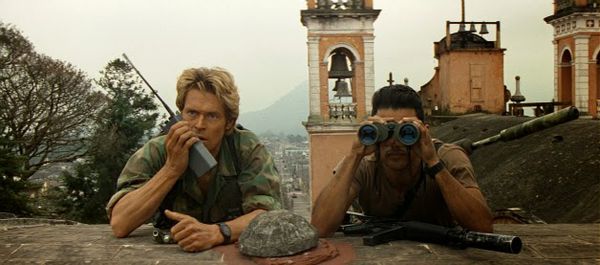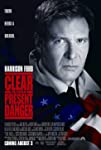Eye For Film >> Movies >> Clear And Present Danger (1994) Film Review
Clear And Present Danger
Reviewed by: Andrew Robertson

Tom Clancy's Jack Ryan is his most lasting creation, a particular flavour of all American hero. He's been played by five actors, including a Batman and a Captain Kirk. He's been written by four authors after Clancy's passing, covering some 19 novels. There are three sets of films, an Amazon Prime series. As fond as I am of The Hunt For Red October, a cast iron exemplar of the genre sometimes called 'science fiction with the President', Clear And Present Danger is probably the most sophisticated of them.
It starts with piracy, ends with testimony, and jaunts up and down the Americas with jet-propelled ease. Not just executive transports but F/A-18 Hornets, black operations squads dropped by Blackhawks, and all of it fuelled not by oil but by white powder and its associated folding green.
It is a new front in the War on Drugs through the lens of the Gulf War (first, American). Not just that but the surveillance apparatus, "the full might" of the United States. That full might isn't just the truncheon of the world's policeman but the new digital revolution. There are computers and fax machines, early mobile telephony. There's simultaneous video, even internet messaging.
Of course the war it's prosecuting is also one informed by the fact that it's 1994. It is precision strikes with the new technology of laser guidance. It is special forces teams whose racially composite make-up is camouflaged by unlabelled uniforms and face paint. It is shadows and angry men in the corridors of power. It is that brief window between the end of the Cold War and the (so far) unending Global War on Terror.
A Toblerone in shot speaks to one set of production realities, the co-operation of the Department of Defense in the use of a variety of assets to another. This isn't quite mechanical film-making, it verges on the clockwork. There are careful moments that introduce elements that will become important later and there's a lot of two-layered framing. A lookout and that which he is looking out upon, a stage-side advisor becoming concerned and the stage-set advisee who is causing that concern.
There are so many moments of parallel activity that I'll just highlight them as a thing to look for. Not just the clandestine and the corrupt, the dual researches of apparatchiks and state-level actors, the privatisation of the post Cold War world. Two location action sequences aren't a novelty but to balance them at the scale of a wintery B&B in New England and a diplomatic protection convoy in Bogota is a feat. James Horner's score pushes everything, from rocket propelled grenades to a printer beeping because it's out of paper. There's a lot of sound at play too, from the transition from funeral drums to automatic weapon fire, the chatter of investigation to an answering machine message.
That set of checks and balances, 'black and white', 'right and wrong', are all grist to the mill of some strong performances. Harrison Ford played Jack Ryan twice. This was his second outing and probably one that plays most to his strengths. He's hangdog and weary, driven by the desire to revenge entities as various as the Constitution of the United States and a friend of his wife.
Willem Dafoe is sterling as Clark, one of the many instruments of warfighting in the US arsenal. He's got form for looking distressed in and around Huey helicopters in the jungle and this is no different. He's one of a slew of familiar faces, from Ted Raimi to James Earl Jones. There's even a tiny Thora Birch trying to persuade her younger brother that what he really wants for breakfast is toast.
The White House too is full of faces you might recognise, and so is the Colombian cartel. Joaquim de Almeida has made a career out of playing baddies, Henry Czerny's played so many spy and FBI guys I've lost count. Donald Moffat might have been born in Devon but I'm always stunned this was one of only two times he played a President.
While it takes some time to establish its structures and personalities, it's in a convoy scene in Bogota that Phillip Noyce gives rein to the physical end of the conflict. The American government has declared a war on the cartels and they are fighting back. There are some astonishing shots, the camera panning around one of the outriders to reveal something that I won't. It's not so much a spoiler because we've already seen the groundwork laid within the film, but I'm going to say that Noyce and his scriptwriters deserve their efforts getting their proper reward.
Clancy's novel is a doorstop, the first edition hardback clocked in at 688 pages. I suspect I read it first in paperback, one of the technothrillers my father would buy and bring home with broken spines and scuffed corners from being read on long-haul flights. At 141 minutes it still moves at a fair pace, and in a modern context that length seems almost restrained.
Adapting it for the screen a triumvirate: Donald Stewart, his third Jack Ryan film, his second with the second actor; Stephen Zaillan won an Oscar that year for Schindler's List, an outpost in his litany of adaptations of literary works; John Milius contributed too, it is (so far) his last direct involvement in a feature film, and his influence in the quantity of action (and explosions) is palpable.
It's also funny. Not continuously, but enough to leaven what could be quite a weighty, if not stodgy mixture. Dialogue is repeated, and not just from previous films. There are also at least three jokes in the acquisition of a helicopter that still make me laugh. There's joking between colleagues too, and at different levels. Insiders, outsiders, VIPs and grunts, nightclubs and aircraft carriers. Gallows humour hangs differently for those on either side of the rope, even velvet ones.
As the film is approaching 30, some of its effects look dated. Compositing on some of the aerial sequences is noticeable. The impressive flight of a bomb across the screen feels as artificial as it actually is. Everywhere else, practical effects continue to work, and in truth you really don't need CGI if the Navy are willing to lend you the USS Kitty Hawk. Does that close level of cooperation affect the film? Probably.
There are several kinds of thriller nested here. There's a murder mystery, but one of those ones where, like Columbo, you've got to remember. There's a conspiracy thriller, and multiple conspiracies at that. There's also plenty of action. Noyce has plenty of thrillers to his credit, but even he has admitted that the climactic battle doesn't quite match the set piece in the middle. That said, the nature of the confrontations changes in accordance with their environments. Some fights are won with cunning and guile and M16 derived carbines, others are won with cunning and guile and memoranda. Treachery, however, is a universal.
I mentioned a velvet rope earlier but some of this is about the iron chain one supposes behind it. The gloves come off here, but in the process hands become dirty. Given how often Hollywood and publishing have returned to the well, it's worthwhile to see what made this draft so satisfying.
Reviewed on: 23 Feb 2022
















